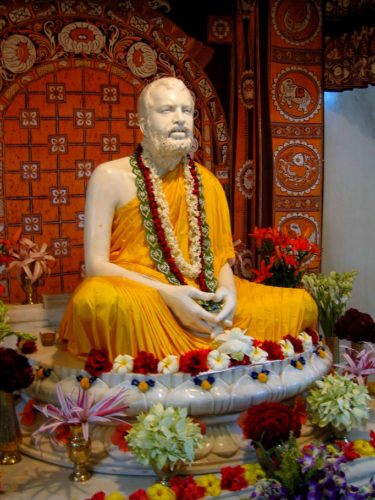Sri Ramakrishna Teaches Us about Meditation
Income from the guide helps me get by and ensures I can continue to offer free content, and every subscription is appreciated. You can find the option to subscribe at the bottom of this post (learn about subscribing with cash/check here).
Revered nineteenth-century Hindu mystic Paramahansa Ramakrishna spoke often about meditation, God, and the Divine Mother – the aspect of God believed to have created the universe.
He had a wealth of interesting ideas about how we can become one with the creator through surrendering and becoming comfortable with the silence.
Many of his ideas were centered on giving up the material world and embracing the spiritual. The world, he taught, is a distraction and a test of faith.
Sri Ramakrishna (and many others) taught that the only true way to know God is through devotion and consistent meditation. Here, we’ll read a few passages from him that explain where, how, and why we should meditate.
Obviously, you don’t have to believe everything you read here. We’re all on our own path, and I don’t expect you to take everything here at face value.
I sometimes disagree with certain passages but share them anyway because they interest me, not because I want you to think they’re the truth.
First, Sri Ramakrishna tells us that we can only meditate through the will of God.
“One cannot meditate unless God wills it. One can meditate when God makes it possible for one to do so.” (1)
If we do the inner work to cultivate such a connection, then we can meditate anywhere.
“You may meditate wherever you like. Every place is filled with Brahman-Consciousness.” (2)
By meditating, he tells us, we turn our attention to the reflection of our divinity within.
“In the Sahasrara, Siva manifests Himself in a special manner. The aspirant should meditate on Him. The body is like a tray; the mind and buddhi are like water. The Sun of Satchidananda is reflected in this water. Meditating on the reflected sun ones sees the Real Sun through the grace of God.” (3)
If we come from the Source – or to take it a step further, we are the Source incarnate – then it makes sense that we each contain a divine spark we can expand upon.
Meditation reveals this expanded aspect of our consciousness, which is known by several names. Some call it God, some call it the higher Self, and some follow it diligently but never question what it is. If you’re in tune with it, then at any time, you can take a few moments for quiet self-reflection.
Sri Ramakrishna implores us not to stay on the surface with our meditation.
“In meditation one must be absorbed in God. By merely floating on the surface of the water, can you reach the gems lying at the bottom of the sea?” (4)
Any time in meditation is time well spent, but so much awaits deep in the subconscious that we’d be silly not to explore it further. The subconscious is uncharted territory; only the most devoted yogis and mystics have plunged deep enough to gain any real insight.
The only thing that separates us from them is how deep we’re willing to go.
Sri Ramakrishna shares a tip for meditating on God.
“In order to meditate on God, one should try at first to think of Him as free from upadhis, limitations. God is beyond upadhis. He is beyond speech and mind. But it is very difficult to achieve perfection in this form of meditation.
“But it is easy to meditate on an Incarnation – God born as man. Yes, God in man. The body is a mere covering. It is like a lantern with a light burning inside, or like a glass case in which one sees precious things.” (5)
First, he instructs, we should meditate on our idea of God – what we believe the creator to be. Gradually, with time, we’ll understand that God is formless. We can then let go of our misconceptions and be at peace with what is.
“By meditating on God with form one speedily acquires devotion; then one can meditate on the formless God. It is like throwing a letter away, after learning its contents, and then setting out to follow its instructions.” (6)
Finally, he shares a lovely analogy.
“Look at the fish. Meditating on the formless God is like swimming joyfully like these fish, in the Ocean of Bliss and Consciousness.” (7)
This can be difficult to understand if you’ve never been deep in meditation.
You can liken it to swimming or flowing in an ocean of love, good vibrations, or whatever you want to call it. We all have different names for this higher power, but no matter how we refer to it, meditation illuminates it.
Sri Ramakrishna shared countless lessons about God and the illusory nature of this world in which we seem cut off from our divinity. He is one of many teachers with insight that, even if you disagree with, is nonetheless profound and fun to read.
Hopefully, his words have helped you in your search for truth.
Footnotes
(1) Swami Nikhilananda, trans., The Gospel of Sri Ramakrishna. New York: Ramakrishna-Vivekananda Center, 1978; c1942, 280.
(2) Ibid., 403.
(3) Ibid., 344.
(4) Ibid., 124.
(5) Ibid., 365.
(6) Ibid., 353.
(7) Ibid., 256.



Comments
Dear amparo,
Thanks a lot and welcome always with Love, Light and Peace....
Sohini
Dear amparo,
I have taken Initiation Mantra Diksha from the RamKrishna Mission in 1971. August.on 13th.
My Gurudev !!
Pranams.
Sohini